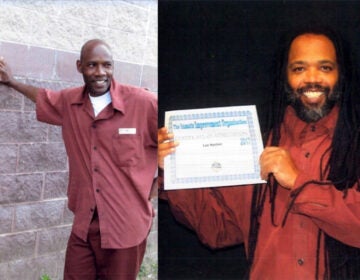New city agency to oversee Philly’s ‘fragmented’ reentry for former prisoners
Philadelphia has a big web of organizations working to reintegrate ex-prisoners. But officials think they need to better coordinate “fragmented” efforts.

Philadelphia skyline (Emma Lee/WHYY)
Philadelphia thinks its new Office of Reentry Partnerships will fix a “fragmented” approach to helping those returning from prison or jail.
The new office, unveiled Monday, will oversee the patchwork of government agencies and nonprofits that work with the estimated 25,000 formerly incarcerated people who return to Philadelphia each year.
“This new office represents a renewed commitment by my administration to take a hard look at what we can do differently to better support the formerly incarcerated,” Mayor Jim Kenney said in a statement.
It will consolidate employees who worked in the Office of Criminal Justice and the Mayor’s Office of Re-Integration Services.
Its existence underscores the need to better coordinate and evaluate services for the formerly incarcerated. That conclusion emerged from a new report, also released Monday.
The study, “Philadelphia’s Reentry Services Landscape,” shows that Philadelphia has a large and diverse network of organizations dedicated to reducing recidivism. Together, the 102 organizations studied in the report serve between 22,930 and 36,425 people each year and have a combined budget of roughly $40 million.
The majority are small organizations, with 65% helping fewer than 1,000 people annually. Many say they have the capacity to do more than they’re already doing. More than 80% of the programs don’t have a waitlist and could serve between 7,000 and 13,000 more people without receiving any more money.
The report, authored by city officials and researchers from Temple University, describes this web of providers as a “solid foundation” for Philadelphia to “build on.” But it also calls the reentry landscape “fragmented and siloed,” with gaps in services and data.
For instance, nearly six in 10 organizations don’t track whether program participants end up back in prison. Roughly eight in 10 don’t keep electronic records of recidivism rates among program participants. And more than half have never received formal evaluations to gauge their effectiveness.
“We’ve got an infrastructure that is really good,” said Bianca Van Heydoorn, whom Kenney appointed as the first senior director of the Office of Reentry Partnerships. “We’ve got an opportunity to improve on that. And who wouldn’t want to do that?”
WHYY is your source for fact-based, in-depth journalism and information. As a nonprofit organization, we rely on financial support from readers like you. Please give today.





